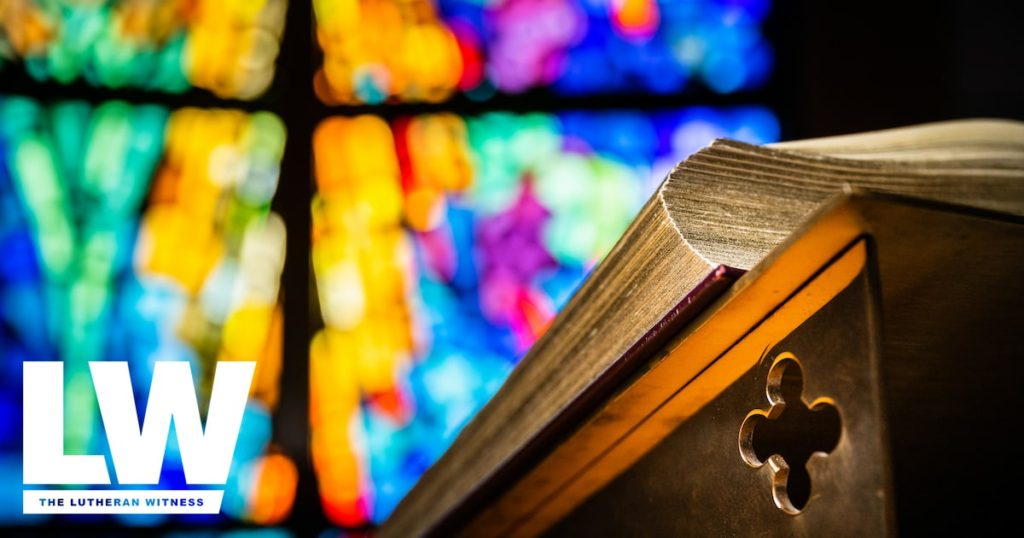by Rev. Dr. Greg Wismar
While many of the seasons of the Church Year have names that relate to the religious nature of the time being observed, the season of Lent does not. The word Lent comes from the Old English word lengthen, which referred to the spring of the year, the time in which the daylight lengthens a little each day (at least in the Northern Hemisphere). The religious content of the word Lent has been added by the faithful observance of the Passion of our Lord, Jesus Christ, by Christian people for a period of time when the daylight was growing each day and spring was beginning.
The earliest root word from which Lent is derived is the ancient Indo-European word that meant “shining,” and, appropriately enough, one of the Lententide chores done in many homes is cleaning and shining the windows of the house. Church windows are often cleaned during t days of Lent as well.
What are the windows like in the building where you worship? Are they plain, clear or opaque glass windows that let in a full amount of light, or are they stained-glass windows that color and change the light of day as it enters the worship space?
Stained-glass windows have a long association with Christian worship. Some of the earliest Christian churches, dating back to the fourth and fifth centuries A.D., contained thinly-sliced alabaster stones set in wooden frames that gave a stained-glass-like effect as the light filtered through them.
The first glazed stained-glass windows began to appear in the seventh century. What seems to be the oldest true stained-glass window in the world, dating back to A.D. 675, is located in a church in coastal England. Throughout the Middle Ages, the craft of designing and erecting stained-glass windows became a great art form. The windows were used to illustrate Bible stories for people who were not able to read and served to bring glory to God by adding beauty to worship spaces from humble country churches to great urban cathedrals.
Some of the Bible stories depicted on stained-glass windows have had windows of their own in them. In the Book of Genesis, it is recorded that Noah opened a window of the ark to let the raven and the dove out of the ship in search of dry land (Gen. 8:6). Another famous through-the-window escape is recorded in Joshua 2. There we read how the men sent to spy on the city of Jericho were let out of the city over the wall by Rahab, the prostitute (and ancestress of Jesus as seen in Matt. 1:5), who “tied the scarlet cord on the window” (Joshua 2:21).
Windows also appear in the New Testament account of the escape of St. Paul from Damascus (2 Cor. 11:33) and his miraculous reviving of Eutychus, a young man who fell from a third-story window at which he was sitting (Acts 20:9). Scripture also relates that windows have been an important feature of God’s house from the time of the first temple, built in Jerusalem by King Solomon (1 Kings 6:4; 7:4).
The season of Lent invites us not only to look at the windows of the special spaces in which we worship God, but also to look through them to the world beyond that needs to hear of the suffering Savior who demonstrated the great love of God through His sacrificial suffering and death. The shining season of Lent is a time not just for clean windows but for open windows too!
—
About the Author: The Rev. Dr. Greg Wismar is pastor emeritus of Christ the King Lutheran Church, Newtown, Conn.
Lent Sundays in March
March 42nd Sunday in Lent
Rom. 5:111: stewards are “reconciled people.” This means that we have been rescued from God’s judgment and condemnation through the life, death and resurrection of Jesus. We who have been baptized into christ have been baptized into his death in order that just as Christ was raised from the dead through the glory of the Father, we too may live a new life (rom. 6:4). That new life is what we call stewardship!
March 113rd Sunday in Lent
1 cor. 1:1831: the good news of salvation in Christ Jesus is that God has chosen us in Christ to be His stewards, that is, the managers of all that He entrusts to us to use for His glory and the welfare of other people. May God’s Holy Spirit give us the power to be good and godly stewards of all of life and life’s resources.
March 184th Sunday in Lent
Eph. 2:110: By God’s grace we have been saved through faith in Jesus. Nothing that we can do makes any difference as far as our salvation is concerned, but what we do as God’s stewards gives evidence that we are God’s workmanship, created in Crist Jesus to do the good works that God has prepared in advance for us to do. May we do this with joy!
March 255th Sunday in Lent
Heb. 5:110: Just as God in Old Testament times called weak and sinful human beings to be priests who called God’s people to be faithful to Him, so He continues to call people like us to be stewards of the mysteries of God so that sinners are encouraged to look to their gracious God for the forgiveness of sins, life and salvation. May we be effective stewards of the Good News of salvation in Jesus so that the Holy Spirit can call many more people into the kingdom of God.
Bulletin sentences courtesy www.lcms.org



